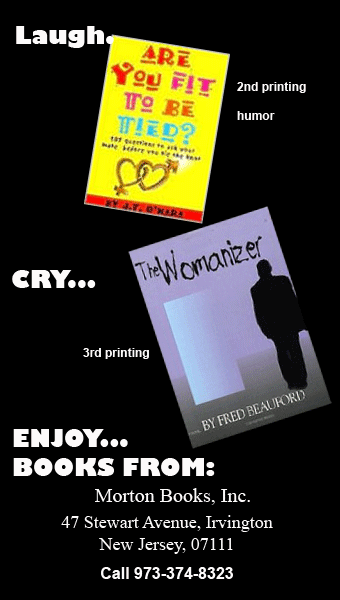MEMOIR
…and Mistakes Made Along the Way, an excerpt from a memoir
by Fred Beauford
Chapter Seven—Death and Boredom
By the time I turned sixteen, the number of arrests of my friends in the Projects mounted; and now, the additional grim specter of death became a part of everyday gang conversation: LM died in jail, from what, we never knew, and George Morton was stabbed to death while walking down a street in the South Bronx. He locked eyes with a man sitting on his stoop, and soon words were exchanged. The man ran up to his apartment and came back down with a large butcher knife and plunged it into George’s chest, killing him instantly. Around the same time, mean Billy Barnes threw musically talented Kush out of a seven-story window.
One death here, one arrest there, and soon the numbers started adding up, resulting in our group becoming increasingly smaller, and the Edenwald Enchanters became a mere shadow of its former, formidable self.
What I didn’t know at the time was that something else laid in wait for my friends, and in about a short two and a half more years, an even deadlier plague, heroin, was going to descend upon the projects and sharply accelerate the mass extinction of this group of human beings, including my best friend, James Johnson.
In the eight years from my sixteenth birthday, out of the 33 members of the awesome Edenwald Enchanters, only five of us were still left alive (All of you budding Darwinists can make out of this what you will,; I have an interesting observation about the survivors. As I looked closely at who they were, it wasn’t great intelligence that saved them. No one was brighter and more intellectual than James Johnson. As far as intelligence was concerned, in some perverse Darwinian logic, it was the highly intelligent and sensitive ones that first succumbed to the plague of drugs and senseless violence, almost as if high intelligence for young black males was a negative, dangerous trait to have; the skunk at the grand picnic that was America at that time.
It wasn’t the color of their skin, either, in that the light-skinned ones, like “Big Red,” and his brother “Crazy,” one of my best friends, were most often the most angry, and most ready to give into violence. And it certainly wasn’t the brave tough guys, like Lenny, another good friend of mine, who were quick with their hands, and who could knock you out with one punch. Nor was it the cold-blooded thugs like Billy Barnes and Superman, who carried knives and guns, and were prepared, without conscience, to use whatever force was needed to defend themselves, or take whatever they wanted.
Nor were the conflict avoiding, cowardly ones spared, or the sleek cats who swiftly ran up and down the basketball court in the playground, dazzling us with their high-flying skills, or the pretty boys like Roger Green, who paraded around, grandstanding on the corner, and showing off their incredible sense of style.
These considerable traits notwithstanding, in the end, they offered my friends in the projects little protection from this unknown, unseen power that was grimly determined to destroy them all, to eliminate this stream of humanity entirely from the human family.
No, the key trait that the survivors all shared, that was dismissively derided at the time, was being one of the “pussy-whipped, cock hounds,” meaning, those guys who were always chasing after some girl, and preferred that activity to hanging with the guys.
Louie was a cock hound. As was Olay and Paul. They all survived.
In addition to being wild and crazy, and fleet of foot, my brother Richard was also a notorious cock hound.
He quickly found what he was looking for, however, and married his wife Jessie at an early age, giving up gangbanging. He borrowed my blue suit for his wedding, and I watched them get married at a Catholic Church in the South Bronx, where she was from. He stayed married to Jessie for thirty some years, and was never without a job after that. They had two sons, who both graduated from college.
Richard lived until his sixties. He died months after Jessie died of cancer. I believe it was of a broken heart.
***The few times I visited him as a grown-up I would always see the sparkle come into his eyes as he relived the great days when he was sixteen, and was named Rabbit, the Prince, if not the King, of Edenwald Projects. ***
As for me, was I also one of the cock hounds? Well, I did write the infamous New York novel, The Womanizer, and I am still here, and even today I wander aimlessly the streets of New York City, like the gay poet Walt Whitman once did; and like him, I still feel that it is the sexiest place on earth, which, as Whitman once put it, “sex was just waiting around every corner;” and I can still feel stirring, and tiny tinglings in my old body as it remembers all the good times and beautiful young ladies that had come my way.
***Let’s just leave at that, or else I could be considered a sexual braggart, and who wants to be known as one of those. Besides, I now know what happens when you just ”Let it all hang out.” I got into enough trouble with The Womanizer, and who needs more of that.
***School was a big blank. I had managed to graduate from junior high school, but I don’t remember a single teacher, or anything I had learned. I do remember that my lifelong love affair for reading began in junior high school, when James Johnson would bring little paperback books to school.
He and I would sit in the back of the classroom with the books hidden in our laps behind large desks, reading away, while not paying any attention to anything the teacher was saying.
I clearly remember that the first book I read was 1984, by George Orwell. I had no idea then that it was considered a classic, and was read and studied by college students. James just said it was a good book, and it turned out that he was right.
When I wasn’t reading, I almost always laid my head on my desk and fell asleep. Now, today, I still cannot believe that no one spotted the fact that I was reading at a college level, even in junior high school.
***Sixteen was the legal age to be able to quit school, or be thrown out. I had barely finished one year of high school. School just wasn’t for me. I found nothing of interest there. My teachers rewarded my indifference by indifference of their own. I left Evander Childs High School in the Bronx, in l956. At that time it did not seem so strange, and was rather expected that a black male be asked to leave, or left on his own. In fact, most of us left on our own before being shown the door.
When I told my mother I was asked to leave, she did not seem in the least bit surprised. My brother Richard had already been tossed out a few years before.
And when I told my friends, they seemed almost relieved, as if to say, "It’s about time, what took them so long," since almost all of them had long since been shown the door, or had left on their own.
In a quiet part of my mind, all of this deeply disappointed me. That quiet part screamed loudly, and longed for someone, anyone, to say, “No, don’t do it. Stay in school, you can be just like the Freybergs.” But no one, not family, friends, nor teachers, said anything like that.
I immediately went to work in the Garment Center, pushing “Jewish Cadillacs,” as we called the heavy-laden carts that carried garments from place to place in the busy center. But I faced layoff after layoff, so most of the time I stood on the corner of 225th Street and Laconia Avenue.
This is when the fourth major trait that I have kicked in. Besides my calm, rational, almost detracted behavior under pressure, my ability to give the finger to peer group pressure, and my sense of guilt over things of which I have no control, is the fact that I get bored very easily.
I experience a terrible feeling of restlessness, and a profound longing for something interesting to do. At times, when I became really bored, I think I will almost burst with anxiety and would feel that I was slowly going crazy.
It has killed more relationships than I care to remember. My ex’s would just look at me with sad eyes, and shake their heads and say, ”You’re just bored, aren’t you?”
I would look away from them, unable to meet their eyes, full of guilt. Yes, I was bored, but it was nothing they had done to cause it. I just was just something I couldn’t help, I really couldn’t. How could I control a mind that was racing manically with unfulfilled desires and grand ideas, which caused me to pace back and forth, lay on the couch, jump up, lay back down and jump up again, while restlessness drove me slowly insane.
I always wanted to do something, go somewhere, and more than anything else, to have a conversation with someone who understood what was going on in my mind.
But who? And why?
I didn’t know what to say to the women I loved, and the four children they bore me, about what was wrong with me; I just felt a deep sense of shame at making them so unhappy. The problem was compounded because I took after my mother in another way. As beautiful as she was, I was also very handsome, with brown eyes lighter than anyone I knew.
The young girls in the projects loved me. A musical standard from the 30s, “Them There Eyes,” had a pop spin during that time: “I fell in love with you first time I looked into…” Well, you know the rest.
That song helped enormously. I could always find a girlfriend. (I can still remember running away from a group of girls from the projects that were chasing me because I didn’t want to be bothered, for I just wanted to hang with the guys. Oh, for those good old days!
I knew that this feeling deep inside of me intimately caused me the greatest pain, because it produced many years of terrible loneliness that no one should face, as lovely woman after lovely woman just gave up on me.
***I was immediately taken with the projects because life there seemed so exciting—filled with sex, danger and constant surprise, unlike the highly structured life I left behind on Carpenter Avenue. But as the years passed, and death, jail, booze, and dope took its deadly toll, I realized that this was not the same place it was in 1954, when I first arrived.
I soon grew bored out of my mind at standing on the corner staring out into space, closely watching everything that moved on the street. I was tried of the same conversations. I was tried of smoking dope and drinking wine all day, and walking back and forth from the playground to the corner, then back to the playground, and back to the corner. There had to be something else to life beside this, or a jail cell.
So, as soon as I turned eighteen, with the grateful blessing of my lovely mother, I joined a new street gang, this one armed with tanks, planes, missiles, ships, and “The Bomb,” and left for the Army on March 15, 1958, and spent the next two years in Germany, with Elvis.
And that’s where I became Fred Beauford.


